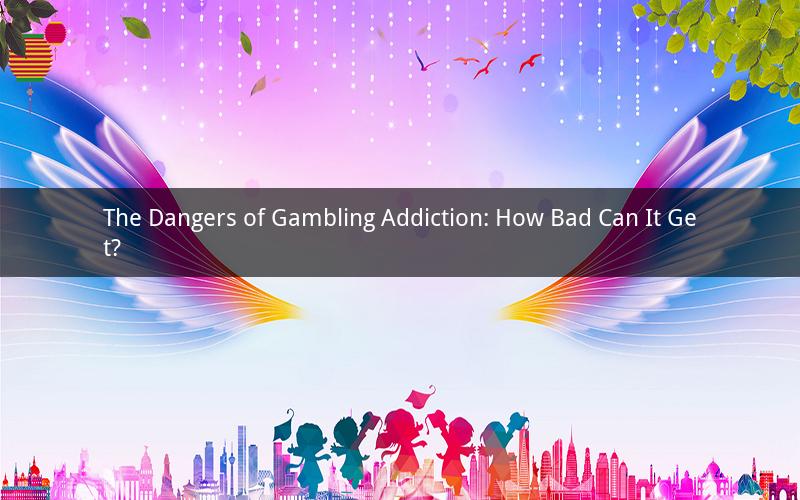
Introduction:
Gambling addiction, also known as problem gambling or compulsive gambling, is a growing concern in today's society. It affects individuals from all walks of life, leading to various negative consequences. This article delves into the severity of gambling addiction, exploring the potential dangers it poses to individuals, their families, and society as a whole. By understanding the extent of the problem, we can take necessary steps to address and prevent its adverse effects.
Section 1: Understanding Gambling Addiction
1. What is gambling addiction?
Gambling addiction is characterized by an uncontrollable urge to gamble, despite the negative consequences it may cause. It is a form of addictive behavior that can lead to significant problems in various aspects of life.
2. Symptoms of gambling addiction
a. Preoccupation with gambling: Constant thoughts about gambling, planning for the next gambling session, and reliving past experiences.
b. Loss of control: Inability to control the amount of time and money spent on gambling.
c. Continued gambling despite negative consequences: Ignoring family, work, or social responsibilities to prioritize gambling activities.
d. Withdrawal symptoms: Feeling restless, irritable, or anxious when unable to gamble.
Section 2: The Severity of Gambling Addiction
1. Financial consequences
Gambling addiction can lead to severe financial problems. Individuals may accumulate massive debts, leading to financial distress, bankruptcy, and even foreclosure. The financial strain can also strain relationships with family and friends.
2. Emotional and psychological impact
Gambling addiction can cause significant emotional and psychological distress. Individuals may experience feelings of guilt, shame, depression, and anxiety. The constant need for gambling can lead to mood swings, erratic behavior, and strained relationships.
3. Social and relational consequences
Gambling addiction can have a detrimental effect on personal relationships. Individuals may become distant from family and friends, neglecting their responsibilities. Marriages can be strained, and friendships can be damaged as a result of the addiction.
4. Legal and criminal consequences
Gambling addiction can lead to illegal activities such as theft, fraud, or embezzlement to fund gambling habits. This can result in criminal charges, imprisonment, and a criminal record that affects future opportunities.
5. Health risks
Gambling addiction can have severe health consequences. Stress, anxiety, and depression can lead to physical symptoms such as headaches, insomnia, and stomach problems. In some cases, it may even lead to cardiovascular diseases and other health issues.
Section 3: Overcoming Gambling Addiction
1. Seeking professional help
Individuals struggling with gambling addiction should seek professional help. Therapists, counselors, and support groups can provide the necessary guidance and support to overcome addiction.
2. Building a support system
Family members and friends can play a crucial role in supporting individuals struggling with gambling addiction. Encouraging them to seek help and offering emotional support can make a significant difference.
3. Financial management
Learning to manage finances is essential in overcoming gambling addiction. Budgeting, seeking credit counseling, and avoiding high-risk financial activities can help prevent relapse.
4. Alternative coping mechanisms
Finding healthy ways to cope with stress, boredom, or emotional issues can help reduce the urge to gamble. Activities such as exercise, hobbies, and spending time with loved ones can be effective alternatives.
5. Self-help strategies
Individuals can employ self-help strategies such as setting strict limits on gambling, avoiding gambling environments, and using apps or tools designed to monitor and control gambling habits.
Conclusion:
Gambling addiction is a serious problem that can have far-reaching consequences. Recognizing the severity of the addiction is crucial in taking necessary steps to overcome it. By seeking professional help, building a support system, and implementing healthy coping mechanisms, individuals can break free from the clutches of gambling addiction and lead a fulfilling life.
Questions and Answers:
1. Q: Can gambling addiction be treated?
A: Yes, gambling addiction can be treated. Professional help, support groups, and self-help strategies can be effective in overcoming the addiction.
2. Q: Are there any warning signs of gambling addiction in a loved one?
A: Yes, warning signs include preoccupation with gambling, loss of control, continued gambling despite negative consequences, and withdrawal symptoms.
3. Q: How can I help a friend or family member struggling with gambling addiction?
A: Offer emotional support, encourage them to seek professional help, and be understanding. Avoid enabling their addiction by lending money or covering up their debts.
4. Q: Can gambling addiction lead to legal problems?
A: Yes, gambling addiction can lead to legal problems, such as theft, fraud, or embezzlement, as individuals may resort to illegal activities to fund their gambling habits.
5. Q: Are there any long-term effects of gambling addiction?
A: Yes, long-term effects can include financial problems, emotional and psychological distress, strained relationships, and health issues. Overcoming gambling addiction is crucial to mitigate these long-term effects.